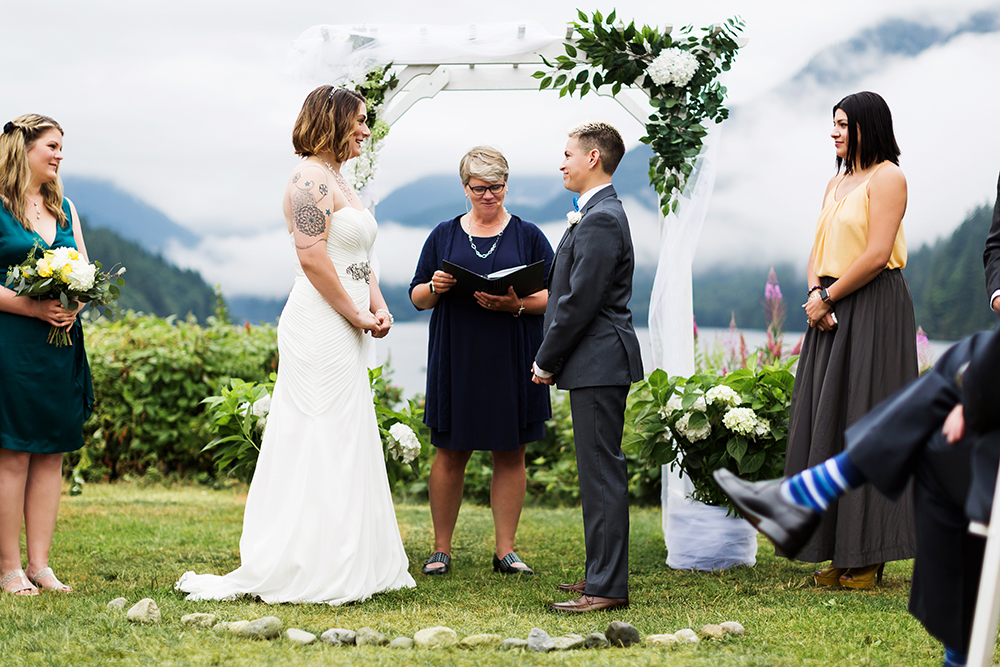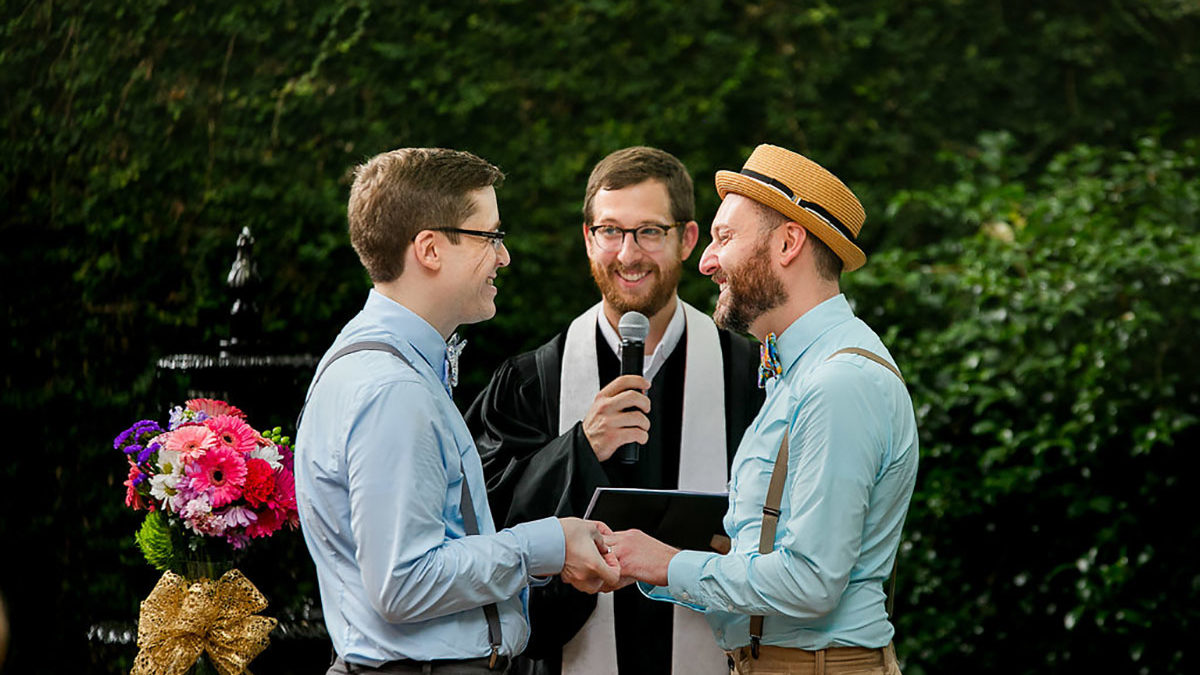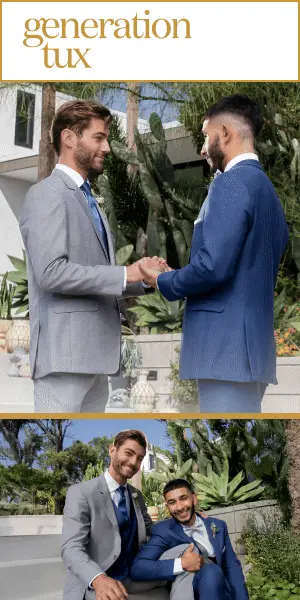One fall night in college, my partner Macey and I were drinking with our friends when the fire alarm went off, forcing us to relocate to Wilson Hall, a nearby academic building. That’s when one of our closest friends, Sarah Jo, became a minister.
That’s the way we like to tell the story, although Sarah had already been thinking about getting ordained so she could officiate weddings. It’s a funnier story when you think about how we’d all been hanging out in our on-campus apartment thinking about going to sleep soon because we were exhausted—and soon we were laughing as Sarah filled out paperwork online.
When Macey and I got engaged late last year, we asked Sarah if she would want to officiate our wedding. We’ve been joking about it since she got ordained that night, but this made it official. It’s not just because it’s a good story—we also have several reasons we really wanted a close friend to marry us.
It’s a lot easier to open up to someone you already know.
Weddings are emotional events. When you’re planning one, you’ll probably end up relaying a lot of your relationship history to strangers who are on your vendor team, like photographers and florists. A wedding officiant wants to tailor the ceremony to you and your partner, so it helps a lot if they’re someone you already know and trust.
Macey and I aren’t close with any religious leaders (and we don’t want a religious ceremony anyway), but we are close with Sarah. She’s been Macey’s friend since elementary school and she became one of my good friends when she transferred to our college. So when she asked us to talk about what we’re looking for in our ceremony, it didn’t feel awkward to ask her questions or explain ideas we have. It felt like we were just back in our dorm complaining about professors.
This can also take some of the guesswork and anxiety out of finding a pro-LGBTQ+ wedding officiant. You likely already know if your friends and loved ones are comfortable officiating an LGBTQ+ wedding and you don’t have to worry as much about paperwork that’s heavy on gendered language like “bride” and “groom” or cisheteronormative traditions.
They can help you manage other aspects of the wedding too.
The planning process can also be overwhelming and stressful, especially if you’re having a large wedding, a destination wedding or a wedding with a lot of little details. If your wedding officiant is also a close friend or family member, they might be willing to help you figure things out beyond just the legal ceremony.
Macey and I are lucky to have friends and family who have been incredible about helping us with whatever we need. Sarah came over with an entire binder and book full of information about the legal process and what an officiant does. She also offered to help us with decorating and any other details we feel stuck on.

A good friend knows when to laugh with you (or cry).
This sort of goes with my first point, but when you have someone you know well as your officiant, they can share all the emotions of the experience with you. Sarah has been invested in our relationship since Macey and I got together, so she cares about this wedding a lot.
Although there’s something to be said for a seasoned professional who can keep you calm, I’d much rather share in the experience with someone who has an emotional investment. Community means a lot to me, and I’m so glad that we get to share this moment with someone who has been a part of our lives for a long time. We’re also lucky that none of our other friends or family members have expressed an interest in officiating—so it’s not like we had to ‘choose’ between anyone!
It’s a great way to honor someone you care about.
The wedding is about the people who are getting married, but it’s also about the community of people who surround them. By asking someone you know to officiate your wedding, you’re essentially saying, “You matter to both of us.”
When we asked Sarah to marry us, that was our way of honoring her as a friend. She was already thinking about our wedding when she got ordained, and that was over four years ago. We have a large wedding party for a similar reason; we want to share this day with so many people and tell them how much their support has meant to us.
This can be trickier if you have multiple friends and family members who are legally able to officiate weddings—or who are interested in starting that process—so that’s important to know before you decide. Macey and I have several friends who are professional photographers, so we opted to hire someone else so we wouldn’t have to choose between people we love. We didn’t have that problem with officiants, so it became a way to let our friend be a central part of our big day.
If you’re thinking of asking a friend to officiate your ceremony, it’s a great idea to ask them a few questions before making the choice:
- Are you legally able to perform weddings? If you aren’t, do you want to be?
- Have you officiated a wedding before? Do you have any interest in officiating?
- Do you have stage fright or are you shy in front of crowds?
- Would this responsibility stress you out or place a burden on you?
- How much do you know about wedding ceremonies (or are you interested in learning)?
- Would you rather enjoy our wedding as a guest without responsibilities, or perhaps as part of the wedding party instead (if applicable)?
- This is what we’re thinking of including in our ceremony. Are you comfortable with these traditions, this language and these aspects of the ceremony?
- Do you have enough time to plan before the wedding?
- Would you want to wear something specific while officiating our wedding?
- How long do you need to think about this before deciding?
Fin Leary
MOST VIEWED STORIES
- Frankie and Ryan’s Romantic San Francisco City Hall Wedding
- An At-Home Love Story in Decatur, GA: Amy and Britt’s Lifestyle Engagement Session
- Beyond the Bread: Creative and Inclusive Gluten-Free Wedding Food Ideas
- Ashley and Stephanie’s Cozy Maine Mountain Wedding at Sunday River
- Love Deserves the Spotlight: Explore 2026’s Freshest Wedding Trends and Share Your Proposal Story for A Chance to Win























